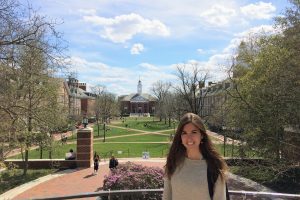
Shortly before the recipients of this year’s 1851 Research Fellowships given by The Royal Commission for the Exhibition of 1851 were to be announced, Amparo Guemes received an email from the fellowship’s selection committee.
Guemes, who earned her PhD from Imperial College in London in 2021 while being co-advised by Johns Hopkins Department of Electrical and Computer Engineering Professor Ralph Etienne-Cummings, knew she was a finalist for one of these prized fellowships.
“Because it was earlier than I expected, I thought that I was going to be rejected, so I had to read the offer letter twice to finally realize I was one of the first awardees,” Guemes said. “My first feeling was of relief because this fellowship is enabling me to pursue the next stage of my career, which is working in the research project I believe in as a postdoc in the Bioelectronics Laboratory, led by George Malliaras, at Cambridge University.”
The 1851 Research Fellowships give early career scientists or engineers of exceptional promise the opportunity to conduct a research project of their own initiation. Competition for the awards is fierce, with only 1% of applicants being accepted and only eight awarded annually. There are 13 Nobel Prize Awardees among the previous fellows.
Guemes’s fellowship starts October 1, and will cover up to three years of postdoctoral research at Cambridge University with Malliaras. She plans to continue the research she started at JHU with Etienne-Cummings, which focuses on developing neurotechnology systems for improving glucose control. Her long-term goal is to develop a novel automated pharmacological-neuromodulation system to help patients control their diabetes.
The system will combine blood glucose measurements and neural signals decoded from peripheral nerves to determine the optimal insulin dose and the characteristics of the electrical stimulation to modulate glucose metabolism as desired.
“For the duration of this fellowship, I will contribute towards this vision by working in the development of neurotechnology hardware and algorithms that enable high-resolution recording and stimulation of peripheral nerves and organs that will be ultimately integrated into a closed-loop platform to improve glycemic control in diabetes” Guemes said.
Prior to coming to JHU, Guemes’s research was entirely computational, consisting of developing mathematical models of the neural control of glucose metabolism. For that reason, Guemes credits her time at JHU as “a keystone for being awarded one of these 1851 Research Fellowships.”
During two PhD research internships at the Homewood campus as part of Etienne-Cummings’s Computational Sensory-Motor Systems (CSMS) Lab, Guemes worked on this research from an experimental perspective, studying the processes she was modeling and broadening her expertise in the field. She also met experts in the field of electrophysiology, neurotechnology, and diabetes, who offered her not only the essential tools and knowledge needed to carry out her research, but also access to experimental facilities, equipment, and insightful discussions that became a major force for advancing her work.
“Amparo is one of the most gifted students I have had in my lab. She is not scared of learning new techniques, even those that are outside her training and comfort zone,” Etienne-Cummings said. “With this fellowship, she will blossom and become one of the high-achievers from the CSMS Lab.”
Guemes is looking forward to expanding her research while also still collaborating and learning from those who have played an important role in her getting to this point.
“Receiving such a prestigious fellowship is more than an opportunity to research: It’s a recognition of the hard work of many years, and a motivation to keep following my research vision and ambition,” she said. “This fellowship also recognizes the constant support and drive received from worldwide-recognized researchers I had the fortune to meet, to whom I would like to express my most sincere gratitude.”